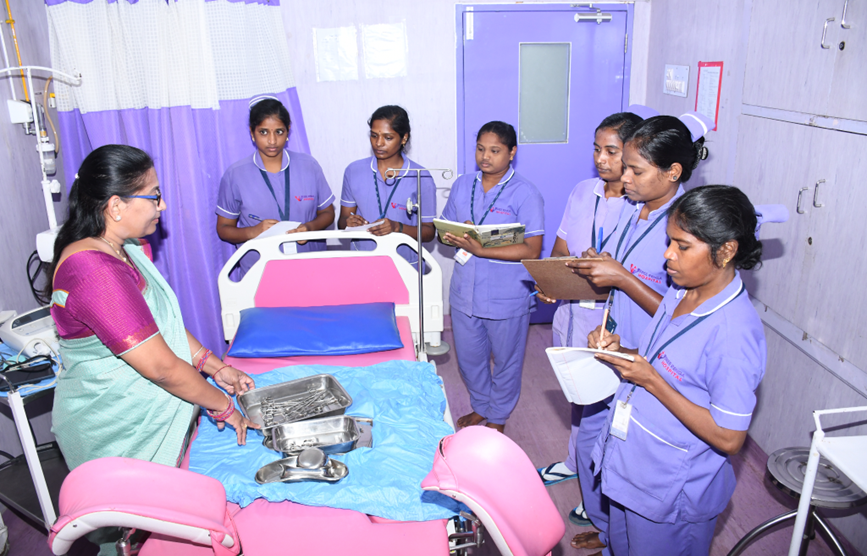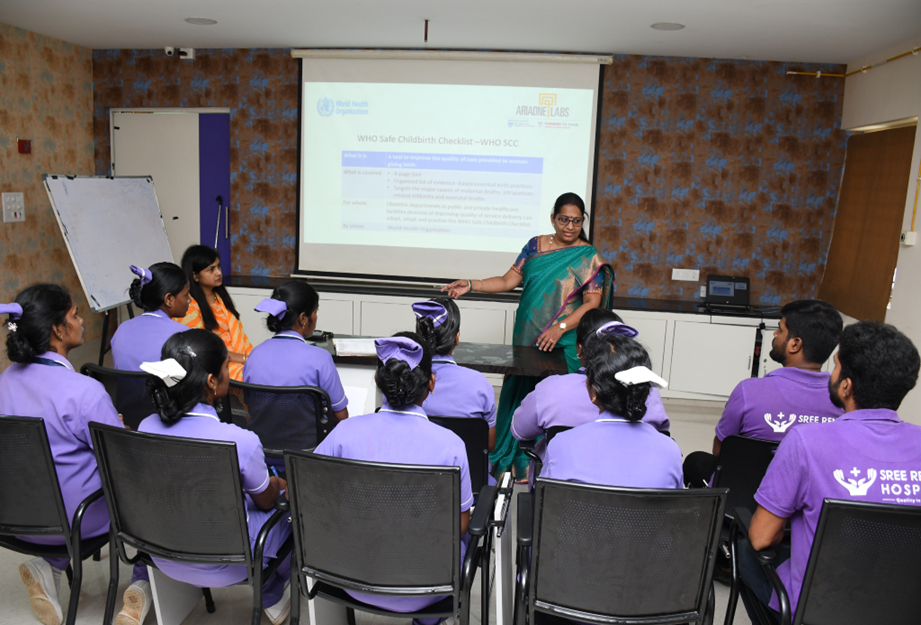Context Assessment Tools Can Strengthen High-Impact Maternal and Newborn Health Interventions: An Example From India
Published on December 20, 2023
By Adam Lindsley, Senior Project Manager, MOMENTUM Knowledge Accelerator. Photos by Mr. Janikraman, Abhirami Photo Studio
Why is it that up to 60% of innovations introduced in health care are never implemented or cannot be sustained?1,2,3
Understanding and including context is key to the success of efforts to adapt and improve health care. With an increase in health care quality improvement (QI) projects globally, consideration of context including hard-to-measure elements such as leadership, staff motivation, and quality improvement experience must not be overlooked.

Dr. Anuradha Pichumani, an obstetrician-gynecologist in Tamil Nadu, India, was determined to understand the unique context of each facility she was supporting with the rollout of the World Health Organization’s (WHO) Safe Childbirth Checklist. Starting in late 2021, Dr. Anuradha led a collaboration among nine hospitals in southern India to scale the Checklist to reduce maternal and neonatal mortality and morbidity. To enable this work, Dr. Anuradha used the Context Assessment Toolkit, a MOMENTUM-revised series of surveys and supportive resources designed to help health care practitioners understand and adjust for the context in which an intervention is implemented. Dr. Anuradha’s experience offers important lessons that can help guide other implementers in successfully assessing the context of their facilities and enhancing their results.
A Single Approach Led to Inconsistent Results from WHO’s Safe Childbirth Checklist
The Context Assessment Toolkit was developed by MOMENTUM Knowledge Accelerator partner Ariadne Labs after their experience with the WHO Safe Childbirth Checklist during the BetterBirth trial. When the Checklist was introduced in 60 health care facilities in Uttar Pradesh, India using a highly standardized implementation strategy, there was significant variation in uptake by the sites. And when uptake data were examined, there was no single explanation that accounted for the mixed results. Instead, MOMENTUM found that multiple factors–including a lack of provider knowledge and unclear communication among staff–were unique contributing factors to the failure of the interventions. But had these factors been analyzed and included as part of the initial assessment, implementation strategies could have been adapted to meet facility-specific needs and improve uptake.
Improvements in Innovation and Resource Use Follow Context Assessment
While administering the Context Assessment Toolkit, Dr. Anuradha and her team conducted 79 interviews and surveys to identify contextual strengths, challenges, and staff and leadership discrepancies in implementation of the Safe Childbirth Checklist. MOMENTUM-supported action plans for each facility that identified steps to build on assessment results were developed. With this context-specific support, the project reported 97% sustainability of the Checklist, a vast improvement from previous implementation efforts.

Experiences like Dr. Anuradha’s provide useful guidance for those seeking to use the Context Assessment Toolkit. In 2021-22, in collaboration with MOMENTUM Country and Global Leadership in Indonesia and Lifebox’s Clean Cut Program in Ethiopia, MOMENTUM Knowledge Accelerator evaluated the Context Assessment Toolkit for feasibility and acceptability in low-resource environments. The evaluation revealed that participants thought the Context Assessment Toolkit led to productive communication and helped identify potential challenges. As a result of the MOMENTUM-led evaluation, the Toolkit was revised to ease translation into different languages, and to augment resources for results interpretation.
Building on this evaluation, here are some additional learnings for anyone considering use of the Context Assessment Toolkit:
- Leadership matters. In order for an intervention to succeed and sustain, high-level buy-in is needed not only from the implementer but also from participating facilities. For example, Dr. Anuradha was able to champion using the assessment results for decision making.
- Timing must be considered. To get the most use out of the Toolkit, it should be incorporated early into work plans and given a corresponding budget. Resources and strategic thinking about when to use the Toolkit help maximize its utility. MOMENTUM Country and Global Leadership and Clean Cut started the assessments prior to the launch of their interventions, allowing them to change course based on results rather than duplicate efforts.
- “Fit” is critical. “Fit” means that the people conducting the Context Assessment can influence change within the facility and are well-positioned to work on any challenges identified, and that suggested pivots align with the facility’s work at the time.
- Strategic communication is essential. Context Assessment results can often expose uncomfortable interpersonal dynamics that must be communicated delicately. Building on “fit,” Assessment results should be delivered in a collaborative manner by trusted individuals who have strong working relationships with facilities. Dr. Anuradha, leveraging her quality intervention experience, was able to have difficult conversations with facility leaders and staff about improvements needed for the intervention to be effective.
What Are the Next Steps for Context Assessment?
The Context Assessment Toolkit is continually being refined for ease of use and efficacy. It is currently being used in a number of facilities around the globe, which offers ongoing opportunities for improvement. If you are interested in hearing more about how to integrate Context Assessment into your work, please reach out to Maklab@prb.org.
References
- Burnes B. Emergent change and planned change – competitors or allies? Int Jrnl of Op & Prod Management 2004;24(9):886–902.
- Sorensen JL, Hall SM, Loeb P, Allen T, Glaser EM, Greenberg PD. Dissemination of a Job Seekers’ Workshop to drug treatment programs. Behav Ther 1988;19(2):143–55.
- Chassin MR, Loeb JM. High-reliability health care: getting there from here. Milbank Q 2013;91(3):459–90.

